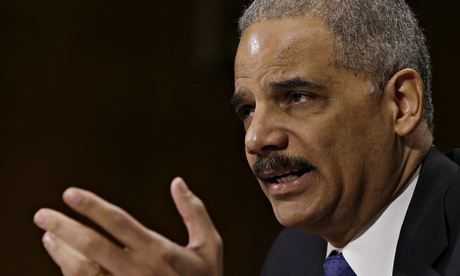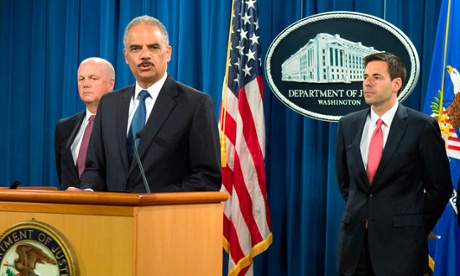China's foreign ministry summoned the US ambassador on Tuesday after the US indicted five Chinese military-affiliated hackers for stealing commercial secrets in an unprecedented cyber-espionage case.
China's foreign ministry called the allegations preposterous and accused the US of double standards. The assistant foreign minister, Zheng Zeguang, summoned the US ambassador, Max Baucus, to lodge a formal complaint, according to state media. The authorities in Beijing also suspended China's role in a joint anti-cybertheft group with Washington.
Zheng told Baucus that China would "take further action on the so-called charges", according to the official Xinhua news agency.
On Monday the US justice department accused China of stealing sensitive information from five US enterprises and a trade union. The FBI printed wanted posters accusing the People's Liberation Army (PLA) officials Wang Dong, Sun Kailiang, Wen Xinyu, Huang Zhenyu and Gu Chunhui of a series of offences, including conspiring to commit computer fraud, aggravated identity theft and economic espionage.
In 2013, the California-based cybersecurity firm Mandiant said Chinese had launched cyber-attacks on 141 organisations across 20 industries. Targets included a range of government departments, private companies, from the Pentagon to the New York Times. NGOs were also targeted. Mandiant linked a number of attacks to a military-affiliated group based in nondescript building on the outskirts of Shanghai.
The five suspects the justice department named allegedly worked from the same building. "The range of trade secrets and other sensitive business information stolen in this case is significant and demands an aggressive response," the US attorney general, Eric Holder, said at a news conference . He said the case should "serve as a wake-up call to the seriousness of the ongoing cyber threat".
Without China's co-operation, the officials are highly unlikely to ever stand trial.
China has long denied US hacking allegations, but its response to the current indictments has been unusually strong. "Up to now, relations between the China and US militaries had been developed well overall," the foreign ministry said in a statement. "The US, by this action, betrays its commitment to building healthy, stable, reliable military-to-military relations and causes serious damage to mutual trust between the sides."
China also accused the US of hypocrisy, tacitly recalling Edward Snowden's revelations last year that Washington had overseen the hacking of Chinese companies, including the Shenzhen-based telecommunications company Huawei.
Washington maintains that it draws a clear line between economic and security-related cyber activity.
Last week, Beijing banned Microsoft's Windows 8 operating system on government computers, laptops and mobile phones, according to Xinhua. The news agency called the ban "a move to ensure computer security after the shutdown of Windows XP," Microsoft's previous operating system.










